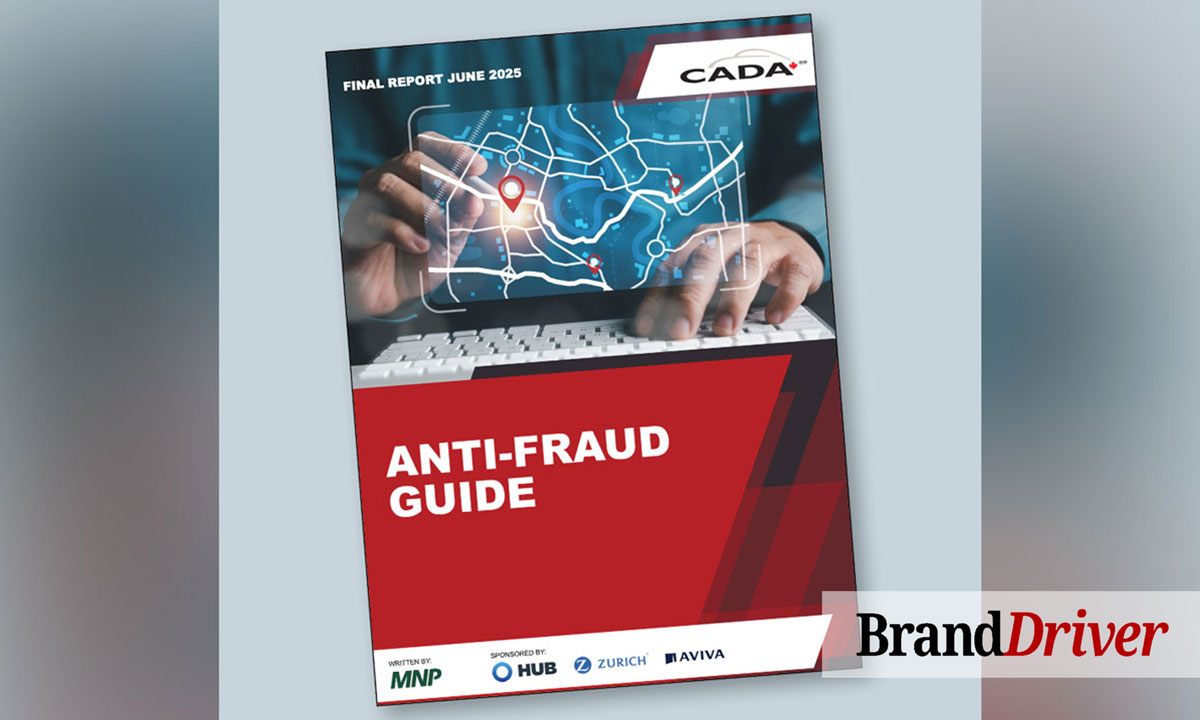Fraudsters are targeting dealerships like never before. CADA’s new Anti-Fraud Guide helps provide some practical advice to help them fight back
As the value of vehicles and parts continues to rise so has the interest of thieves and fraudsters who are trying to get their hands on them. They are actively targeting dealerships, probing their defences and looking for weak links.
Dealerships have to remain hyper vigilant, and that means following stricter processes for vetting and screening their own team members — particularly new hires — and putting measures in place to ensure buyers are really who they say they are.
To that end, CADA commissioned research partner MNP to produce the new CADA Anti-Fraud Guide filled with tips and best practices on how dealerships can better protect their operations. Along with expert advice, the 60+ page guide also features feedback and ideas provided by CADA member dealers.
“Everything we offer through our CADA 360 Services is related to risk management,” said Michael Psotka, CADA’s CFO and Director of Member Services. “We produced this Anti-Fraud Guide so our dealers had the most up-to-date information about how to protect themselves, and mitigate the impact on their insurance premiums.”
Psotka said dealers have been telling the association they are concerned with increased fraud. “Whether it’s auto theft, fake identities from buyers or employee fiduciary responsibility, you name it, the potential for fraud is out there,” said Psotka. “It’s becoming more prominent in our industry whether we like it or not.”
One of the main sponsors of the Anti-Fraud Guide is HUB International, the approved insurance broker for the CADA 360 Garage Insurance Program. Paul Embrack, National Underwriting Manager at HUB International, said that all the measures dealerships can take to fortify their operations and reduce fraud and loss can have an impact on how a carrier perceives them as a risk — and that impacts premiums.
As part of their CADA 360 programs, Psotka said, CADA offers free employee background checks for dealers using CADA 360 Garage Insurance or CADA 360 DriveHR. This service is also available to dealers not on these two programs at very low cost.
“If I were to just put two umbrella terms out there, it’s know your customer and know your staff,” said Embrack. “Look for any irregularities within and ask, with internal numbers, sales reports or customer information. There are often small outliers when it comes to fraud.”
Embrack said dealers need to tighten their onboarding processes. “The HR and onboarding practices are a big part of my conversations with the dealers and controllers,” said Embrack. “How are you onboarding new employees? Are you pulling driver’s abstracts? Are you pulling a criminal background check? If they are in the accounting office, are you doing a financial or credit check on them?”
As part of their CADA 360 programs, Psotka said, CADA offers free employee background checks for dealers using CADA 360 Garage Insurance or CADA 360 Drive HR. This service is also available to dealers not on these two programs at very low cost.
In terms of insurance premiums, HUB International’s Embrack said some dealerships might be targeted because of known vulnerabilities or because they sell a vehicle that is highly-sought after by car thieves. “Auto theft is a lucrative market for criminal organizations,” said Embrack. “The level of sophistication is rising at an alarming rate, and that’s just going to lead to more thefts as a result of fraud.”
Sathyan Laloo, Senior Risk Services Consultant, HUB International says when dealerships get complacent with the basic risk control measures, that’s when they can be vulnerable to fraud.
“It’s just a matter of training and having that risk management mindset from the top down with some sort of process for auditing and having a second set of eyes on the entire operation on a regular basis,” said Laloo. “That’s what we’re trying to bring to this with the risk management approach.”
Having a sign-in process for people coming to the dealership, verifying their identification for test drives and having checks in place can help thwart bad actors. “These are the best practices and we’re not telling you this because it’s theory,” said Laloo. “We’re telling you this because we see the claims every day and we see how these small little things can be improved upon just to mitigate your exposure to losses.”
Laloo said when he visits dealerships the number one issue he flags is key control. “You’ll see a dealership that has a lot of thefts even though they have an electronic key machine. But when I do my actual site walkthrough I see that everyone has keys on their desks, or sitting on the service counter or even on the reception desk all day,” he said, adding that sometimes the drawer to the key machine is just left open all day.
Laloo said some dealers are very proactive with risk management and take it seriously, and others less so. “We’re not trying to tell them how to run their business. It’s just implementing best practices to make it beneficial for all.”
CADA has sent its dealer members the Anti-Fraud Guide, which is now available in the Knowledge section of the CADA website, accessible exclusively to members through sign-in.

















